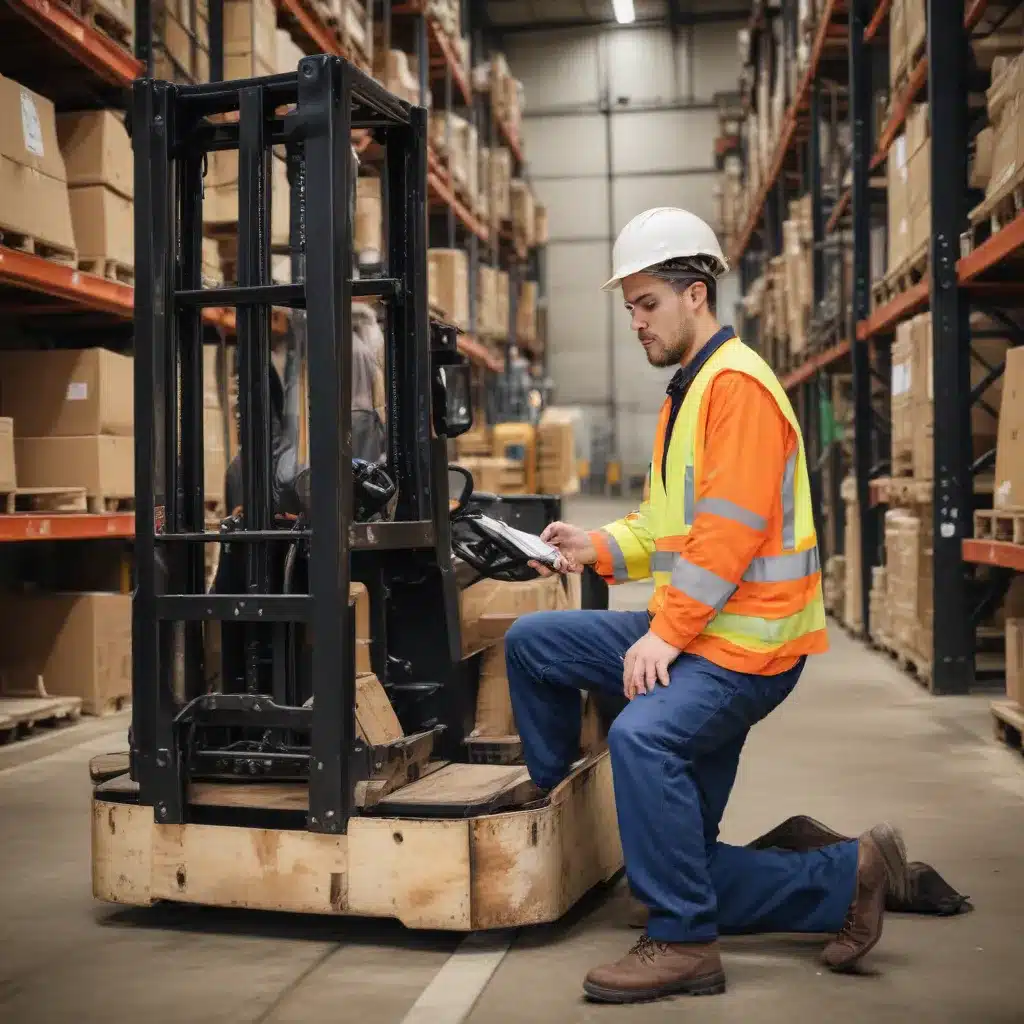
The Importance of Forklift Operator Mentorship
Forklift operations are the backbone of many logistics, warehousing, and manufacturing industries, keeping supply chains moving efficiently and safely. However, the potential risks associated with improper forklift handling can pose serious threats to operator safety and overall workplace productivity. As an experienced industry expert, I’ve witnessed firsthand the transformative impact of effective forklift operator mentorship programs in cultivating a culture of safety and best practices.
At the heart of successful forklift operations lies the transfer of knowledge and skills from seasoned veterans to newer operators. Mentorship programs provide a structured framework for experienced forklift operators to impart their wisdom, instill safety-first mindsets, and guide less experienced team members through the complexities of maneuvering these powerful machines.
Bridging the Experience Gap
Forklift operation requires a delicate balance of technical skills, situational awareness, and sound judgment – attributes that are often best acquired through hands-on experience. Newer forklift operators, even those who have completed formal training, can greatly benefit from the tutelage of veteran mentors who have navigated a wide range of real-world scenarios.
Mentors can offer invaluable insights into anticipating and mitigating potential hazards, optimizing load distribution and handling techniques, and navigating tight spaces or congested work environments. By shadowing experienced operators and receiving personalized feedback, novice forklift drivers can more quickly develop the intuition and decision-making skills necessary to operate safely and efficiently.
Establishing a Comprehensive Mentorship Program
Crafting an effective forklift operator mentorship program requires a strategic and multifaceted approach. Here are the key elements to consider:
1. Identifying Skilled Mentors
The foundation of any successful mentorship program lies in securing the right mentors – experienced forklift operators who not only possess exceptional technical skills but also the patience, communication abilities, and passion for training the next generation. Look for individuals who have consistently demonstrated a commitment to safety, a strong work ethic, and the ability to effectively convey complex concepts.
2. Structured Training Curriculum
Mentorship programs should follow a structured curriculum that covers both theoretical knowledge and hands-on practical training. This may include:
- In-depth reviews of forklift operating manuals, safety protocols, and maintenance procedures
- Instruction on load dynamics, maneuvering techniques, and navigating challenging environments
- Scenario-based training exercises to test decision-making and problem-solving skills
- Continuous assessment and feedback mechanisms to track mentee progress
By establishing a comprehensive curriculum, mentors can ensure that mentees develop a well-rounded skill set and a deep understanding of safe forklift operations.
3. Fostering a Culture of Continuous Learning
Forklift safety and best practices are not static; they evolve alongside technological advancements, regulatory changes, and industry trends. Effective mentorship programs should encourage a culture of continuous learning, where both mentors and mentees actively seek out new information, attend refresher training sessions, and share innovative techniques.
Encouraging mentees to ask questions, provide feedback, and contribute their own insights can help cultivate a collaborative learning environment. Regular check-ins, skill assessments, and opportunities for further development can keep forklift operators engaged and motivated to continuously improve their abilities.
4. Emphasizing Safety as the Top Priority
At the core of any successful forklift operator mentorship program must be an unwavering commitment to safety. Mentors should lead by example, modeling safe behaviors and a safety-first mindset in all aspects of their work. They should also be empowered to enforce safety protocols, address any unsafe practices, and provide immediate corrective feedback to mentees.
Ongoing safety training, equipment inspections, and incident reviews should be integral components of the mentorship program, reinforcing the importance of a proactive approach to forklift safety.
Benefits of Forklift Operator Mentorship
Implementing a comprehensive forklift operator mentorship program can deliver a host of benefits, both for the individual operators and the organization as a whole:
-
Enhanced Safety: By systematically passing down safety knowledge and best practices, mentorship programs help reduce the risk of forklift-related accidents, protecting both operators and surrounding personnel.
-
Improved Operational Efficiency: Experienced mentors can guide mentees in maximizing forklift utilization, optimizing load handling, and streamlining workflow processes, ultimately boosting overall productivity.
-
Stronger Teamwork and Morale: Mentorship programs foster a collaborative and supportive work environment, where experienced operators take an active role in developing their peers. This can lead to improved team dynamics, job satisfaction, and employee retention.
-
Talent Development and Succession Planning: Mentorship programs serve as a powerful tool for cultivating a pipeline of skilled and safety-conscious forklift operators, ensuring the continuity of critical operational capabilities.
-
Compliance and Risk Mitigation: By adhering to industry standards and regulatory requirements, mentorship programs help organizations maintain compliance and mitigate legal and financial risks associated with forklift-related incidents.
Embracing the Future of Forklift Operations
As the logistics and warehousing industries continue to evolve, the role of forklift operator mentorship programs will only become more essential. By investing in the development of their forklift teams and fostering a culture of safety and continuous improvement, organizations can position themselves for long-term success.
Embracing the wealth of experience and expertise that seasoned forklift operators possess and actively passing it down to the next generation is a strategic imperative. Through comprehensive mentorship initiatives, organizations can empower their workforce, enhance operational resilience, and ensure the safe and efficient handling of materials that underpin their supply chain success.
To learn more about optimizing your forklift operations and implementing effective mentorship programs, I encourage you to explore the comprehensive resources available on Forklift Reviews. Together, we can elevate the standards of forklift safety and operational excellence across industries.
Key Takeaways
- Forklift operator mentorship programs are crucial for bridging the experience gap and cultivating a culture of safety.
- Effective mentorship initiatives should focus on identifying skilled mentors, establishing structured training curricula, fostering continuous learning, and prioritizing safety.
- Benefits of forklift operator mentorship include enhanced safety, improved operational efficiency, stronger teamwork and morale, talent development, and risk mitigation.
- Embracing forklift operator mentorship is a strategic imperative for organizations seeking to maintain a competitive edge and ensure the long-term success of their logistics and warehousing operations.

